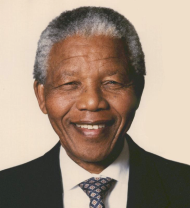
“My hunger for the freedom of my own people became a hunger for the freedom of all people, white and black. I knew as well as I knew anything that the oppressor must be liberated just as surely as the oppressed.” – Nelson Mandela
This is part 2 of a 9-part blog series focused on your Leadership Legacy: Playing a Bigger Game at Work. Considering that Bigger Game is a model and methodology that creates intentional, positive change, it felt natural to quote the departed, beloved Nelson Mandela. He was the epitome of a Bigger Game player; his was a life worth celebrating. In 1964 Mandela received a life sentence for committing sabotage against South Africa’s apartheid government and spent 27 years of his sentence imprisoned. In those years of imprisonment, Mr. Mandela’s hunger for social justice remained undeterred.
At age 76, Mr. Mandela became the first black leader of a democratic South Africa, a feat that could not be realized without bold action, a compelling purpose, sustainability, investment, assessing and reassessing, stepping outside of his comfort zone and of course hunger. Mandela’s leadership legacy is entrenched in the hearts of millions all over the world and it all started with his hunger for social justice for all. Although the impact of this warrior’s legacy may have various meanings for different people, the essence of it is profound and unmistakably far-reaching. For me, his leadership legacy makes me want to be a better person and lead a more purpose driven life. Funny how someone else’s hunger can transform your own desires, as his did for me.
In our first blog in the series you were introduced to the game board square comfort zones and asked to determine if your comfort zones serve you or cost you. Today, let’s explore the hunger square.
HUNGER
Hunger is a strong desire or craving for something. Over time, complacency and boredom creates a hunger for something more. Although we may not know what we hunger for, we know we yearn for something more; to have more meaning to our lives – an unspecified alternative to the current situation if you will. Hunger is an indication that we are open to new possibilities! Often, we just need to step outside of our comfort zones to feed our hunger and create something more in our lives, in our teams and in our organizations.
Reflect on these questions as you assess your own leadership legacy:
- Are you leading in a way that makes your team desire to follow and deliver at a higher level?
- Is the commitment there even when you are not?
- What do you stand for and what are you willing to create through your leadership?
Your answers to those questions may be an indication that your leadership legacy is in need of some attention. You may want to begin with uncovering your hunger. Give it a try by completing the sentences below:
- My professional life would be more meaningful if…
- What I want for my organization is…
- What I want for my team is…
- The difference I could truly make is…
- What I am starving for in my professional life is…
It isn’t necessary to be an iconic figure creating something of huge proportion in order to capitalize on something to feed your hunger. You can be a change catalyst within your own community, organization or department. Mandela didn’t know what outcomes would result of his hunger but what is evident is that a movement began as a result of his desire to “be fed”.
While Mandela was still incarcerated, I remember going to see a Soweto children’s group perform a rendition of Free Mandela and it was thrilling to experience through song and dance, the impact of this man’s hunger. While sitting in the theater, I wondered how such a feeling could come over me; it was as if I was in the midst of the movement in South Africa. It wasn’t until many years after the performance that I realized I was, in fact, a part of the movement and had taken part to support him through my words, donations and actions.
